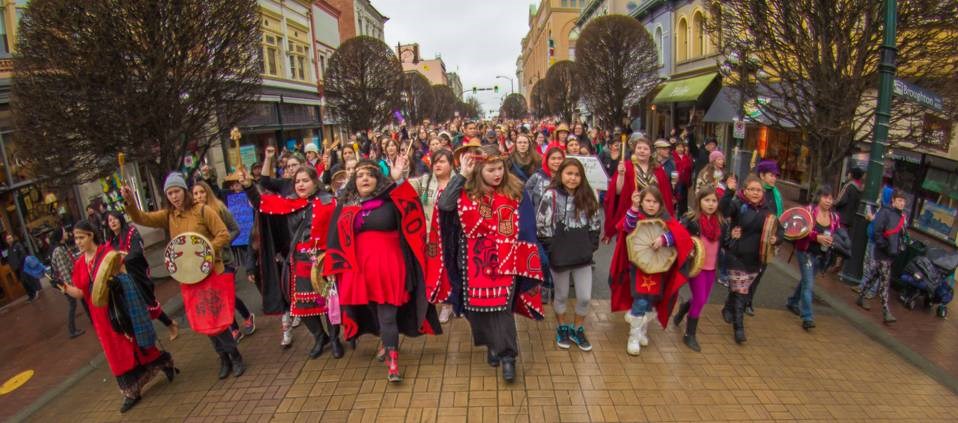The message conveyed during the eighth annual Stolen Sisters Memorial March downtown on Sunday was clear: Indigenous lives matter.
An estimated 1,200 people — the largest crowd in four years — attended the march to remember aboriginal women and girls who have died or gone missing. It’s one of several such marches held across Canada.
Several participants attributed the rise in attendance to cautious optimism over Prime Minister Justin Trudeau’s pledge to address a long-ignored concern aired by Canada’s First Nations communities. In December, Justice Minister Jody Wilson-Raybould, the first indigenous person to hold that position, announced the launch of a national inquiry into murdered and missing indigenous women and girls.
“That news was well received,” said organizer Christine Lavallee, as hundreds of supporters marched down Government Street singing the Women’s Warrior Song symbolizing empowerment and unity. “There are well over 1,000 missing indigenous women now Canada-wide, and that’s not even including the men, as well.”
The crowd led by indigenous women, youth and drummers marched from Our Place to the front of the B.C. legislature about noon.
The marchers shared food, along with heartfelt stories, singing and drumming. Many participants from First Nations communities wore traditional garb.
Dora Joe, whose Cowichan tribes family was born and raised below the Stone Church in Duncan, delivered a moving remembrance in honour of her oldest sister Catherine, who was murdered in 1977.
Mourning the loss “of the sister who was taken from us,” her tribute was poetic as she recounted the horror of the discovery, and her choice to share Catherine’s story and help others rather than avenge the murder.
“That was very emotional me for me,” said Joe, accompanied by family members, including her sister Helen and Catherine’s grownup children.
Erynne Gilpin, whose family comes from The Pas in northern Manitoba, eloquently paid tribute to her cousin.
“I offer deep gratitude to all the families and folks here today standing for the dignity and honour of indigenous families around this world,” said Gilpin, a member of the Manitoba Métis Federation.
“She is present here today," Gilpin said of her cousin. "Let us walk together toward a world where all worlds can fit.”
Kelly Aguirre, an indigenous activist and PhD candidate in the University of Victoria's department of political science, emphasized that Sunday’s event was not a protest.
“It’s not an action against the Canadian government or state,” said Aguirre, holding a hand drum adorned with art. “It’s a healing process, a ceremonial chance to come together and show that these women are not forgotten. They are the lifeblood in the hearts of their people.”
Carole James, NDP MLA for Victoria-Beacon Hill, and Victoria MP Murray Rankin arrived together to show solidarity.
Praising the federal government for launching the commission “so many communities have been fighting so long to get,” James said she was heartened by the strong turnout and diversity.
“This is an issue for every Canadian and every British Columbian,” she said. “It’s an issue we all need to pay attention to.”
Rankin said its success has inspired him to speak to Wilson-Raybould and Indigenous Affairs Minister Carolyn Bennett.
“I’m going to say: ‘Look what I just saw. Look how many people here in our community care deeply about this. It’s reflected in the number of people who turned up today.'”



